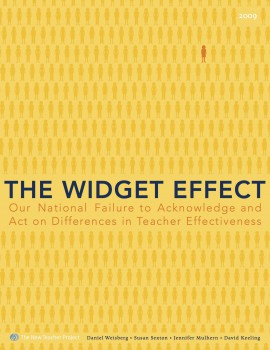This report explores public school districts’ failure to measure or record teacher effectiveness in any meaningful way and argue that in addition to measuring and recording teacher effectiveness, school districts should use that information to inform decision-making. They lament that the only way to determine who effective and ineffective teachers are is usually through word of mouth.
The authors assert that the failure of evaluation systems in education to provide accurate and credible information sustains and reinforces the Widget Effect, which is the tendency of school districts to assume classroom effectiveness is the same from teacher to teacher. These are some of the problems the authors see in teacher evaluations:
- All teachers are rated good or great
- Excellence goes unrecognized
- Failure to identify areas of development needs
- Inattention to novices
- Poor performance goes unaddressed
The authors suggest these steps to reversing the Widget Effect:
- Adopt a comprehensive performance evaluation system that fairly, accurately, and credibly differentiates teachers based on their effectiveness in promoting student achievement.
- Train administrators and other evaluators in the teacher performance evaluation system and hold them accountable for using it effectively.
- Integrate the performance evaluation system with critical human capital policies and functions such as teacher assignment, professional development, compensation, retention, and dismissal.
- Adopt dismissal policies that provide lower-stakes options for ineffective teachers to exit the district and a system of due process that is fair but efficient.
Authors: Daniel Weisberg, Susan Sexton, Jennifer Mulhern, David Keeling




